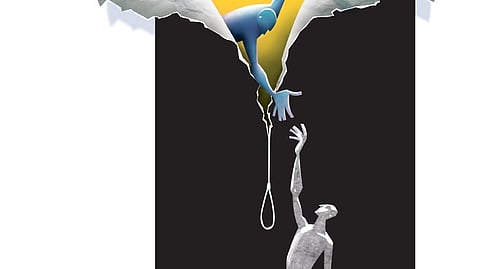

KOCHI: Recently, a middle-aged woman swallowed pesticides in an attempt to end her life. A significant amount of money was spent to save her from a near-death critical stage. A layperson’s assessment of her suicide attempt focused on the stress related to her high-pressure job and marital issues. She received some common-sense advice before being discharged.
However, after a second attempt within three months, she was finally given a professional mental health evaluation. She was diagnosed with major depressive disorder, which had begun during her perimenopausal phase.
As we observe Suicide Prevention Day, which calls for changing the narratives on suicide, we need to reflect on how we provide help to people who attempt suicide. Any amount of money spent on saving lives after a suicide attempt may be wasted if that cry for help is not followed by connecting the individual to ongoing mental health support.
Will Decriminalisation Help?
The stigmatising Section 309 of the Indian Penal Code (IPC) used to expose individuals going through stress to punishment and fines if they attempted suicide in moments of desperation. A transformative step was taken with the Mental Healthcare Act of 2017, which decriminalised suicide attempts.
Unfortunately, family members and loved ones often fail to notice these signs. We need to improve our ability to recognise warning signs through mental health first aid. Once these signs are observed, individuals should be listened to with empathy and without judgement. The current approach – which often involves lecturing and giving advice – needs to be replaced.
At times, feeling suicidal may be normal, and it is important not to stigmatise these feelings. Suicidal thoughts are often a cry for help from individuals in distress. Some may have untreated or under-treated psychiatric disorders.
Depression, in particular, is often missed by those in close contact. Even when it is noticed, people are often reluctant to speak up, believing it is wrong to feel this way. However, untreated depression is a high-risk factor for suicide.
Are you hearing their cries?
To take constructive action as a community, we must change the current narratives around suicide. Remember that in 2022, at least 10,162 families in Kerala experienced a unique form of grief, carrying guilt for not recognising their loved ones’ distress.
They often express anger towards the person who ended their life without openly sharing their suffering or intent to die. “If only they had told us, we could have helped,” they lament. Every hour, one person in Kerala takes their life, and many more attempt to do so.
The number of suicides is increasing every year. It is time to activate the State Action Plan for suicide prevention. Let us stimulate community action to reduce the number of suicides. Changing the narrative is essential if we are to stimulate action and save lives from suicide.
(If you are having suicidal thoughts, or are worried about a friend or need emotional support, someone is always there to listen. Call Sneha Foundation - 04424640050, Tele Manas - 14416 (available 24x7) or iCall, the Tata Institute of Social Sciences' helpline - 02225521111, which is available Monday to Saturday from 8 am to 10 pm.)
(The writer is senior psychiatrist, Medical Trust Hospital, Kochi)